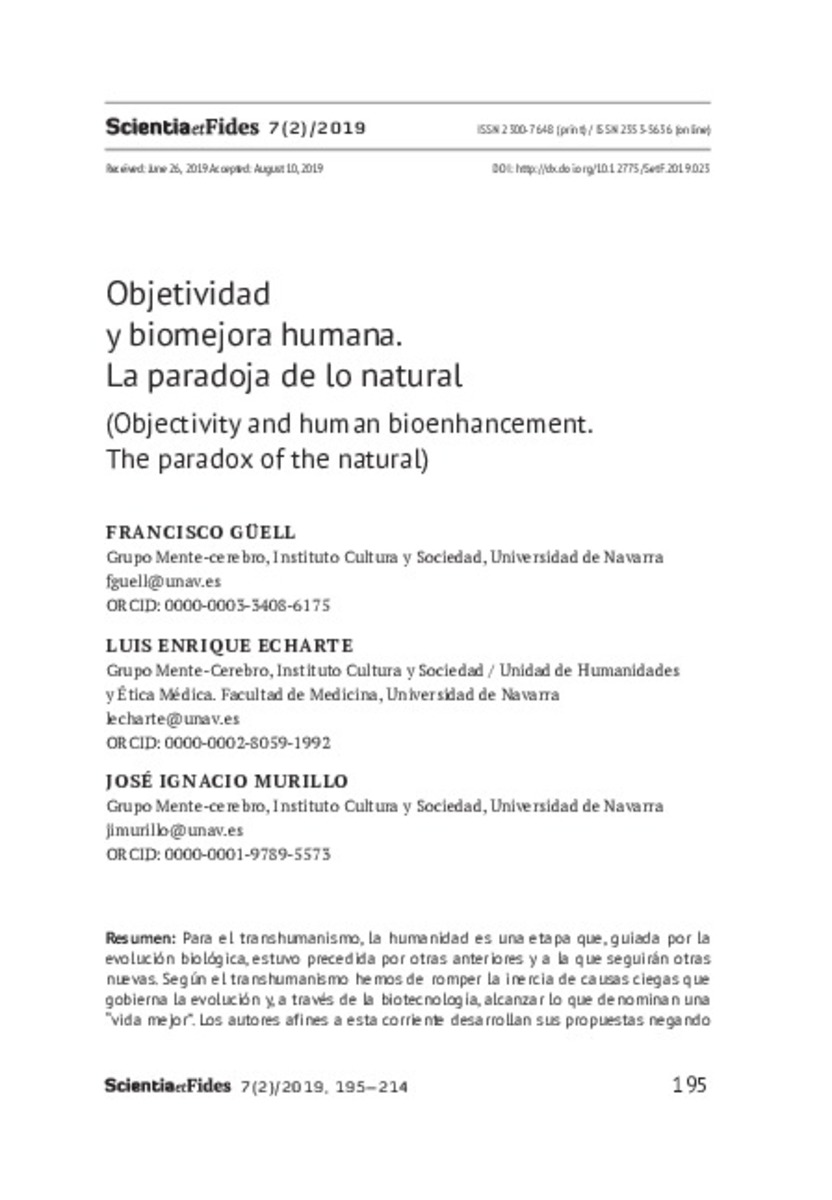Full metadata record
| DC Field | Value | Language |
|---|---|---|
| dc.creator | Güell-Pelayo, F. (Francisco) | - |
| dc.creator | Echarte-Alonso, L.E. (Luis Enrique) | - |
| dc.creator | Murillo, J.I. (José Ignacio) | - |
| dc.date.accessioned | 2019-10-15T13:34:56Z | - |
| dc.date.available | 2019-10-15T13:34:56Z | - |
| dc.date.issued | 2019 | - |
| dc.identifier.citation | Güell-Pelayo, F. (Francisco); Echarte-Alonso, L.E. (Luis Enrique); Murillo, J.I. (José Ignacio). "Objetividad y biomejora humana. La paradoja de lo natural". Scientia et Fides. 7 (2), 2019, 195 - 214 | es |
| dc.identifier.issn | 2300-7648 | - |
| dc.identifier.uri | https://hdl.handle.net/10171/58300 | - |
| dc.description.abstract | Para el transhumanismo, la humanidad es una etapa que, guiada por la evolución biológica, estuvo precedida por otras anteriores y a la que seguirán otras nuevas. Según el transhumanismo hemos de romper la inercia de causas ciegas que gobierna la evolución y, a través de la biotecnología, alcanzar lo que denominan una “vida mejor”. Los autores afines a esta corriente desarrollan sus propuestas negando la existencia de una naturaleza humana, pero sin abandonar la convicción de que resulta posible definir en qué consiste una “vida mejor”. En este artículo analizamos la claridad y el rigor con la que presentan el fin último de su propuesta, la relación entre el fin y los medios planteados para alcanzarlo, y, finalmente, pondremos de manifiesto algunas inconsistencias derivadas de su rechazo de que la naturaleza humana pueda tener valor normativo. | es_ES |
| dc.description.abstract | For transhumanism, humanity is a stage which, guided by biological evolution, was preceded by other earlier stages and which will be followed by others that are newer. According to transhumanism, we must break the inertia of blind causes that govern evolution and, through biotechnology, attain what is called a “better life”. Those authors who are supportive of this current of thought develop their proposals by negating the existence of a human nature, but without abandoning the conviction that it will be possible to define what a “better life” consists in. In this article we will analyze the clarity and rigor with which transhumanists present the ultimate goal of their proposal, the relation between the end and the means proposed for attaining it, and, finally, we will bring to light certain inconsistencies that result from their rejection of the position that human nature could have a normative value. | es_ES |
| dc.language.iso | spa | es_ES |
| dc.publisher | Uniwersytet Mikołaja Kopernika | es_ES |
| dc.rights | info:eu-repo/semantics/openAccess | es_ES |
| dc.subject | Transhumanismo | es_ES |
| dc.subject | mejora biotecnológica | es_ES |
| dc.subject | manipulación genética | es_ES |
| dc.subject | bienestar | es_ES |
| dc.subject | calidad de vida | es_ES |
| dc.subject | naturaleza humana | es_ES |
| dc.subject | transhumanism | es_ES |
| dc.subject | enhancement | es_ES |
| dc.subject | genetic manipulation | es_ES |
| dc.subject | well-being | es_ES |
| dc.subject | quality of life | es_ES |
| dc.subject | human nature | es_ES |
| dc.title | Objetividad y biomejora humana. La paradoja de lo natural | es_ES |
| dc.title.alternative | Objectivity and human bioenhancement. The paradox of the natural | es_ES |
| dc.type | info:eu-repo/semantics/article | es_ES |
Files in This Item:
Statistics and impact
Items in Dadun are protected by copyright, with all rights reserved, unless otherwise indicated.






